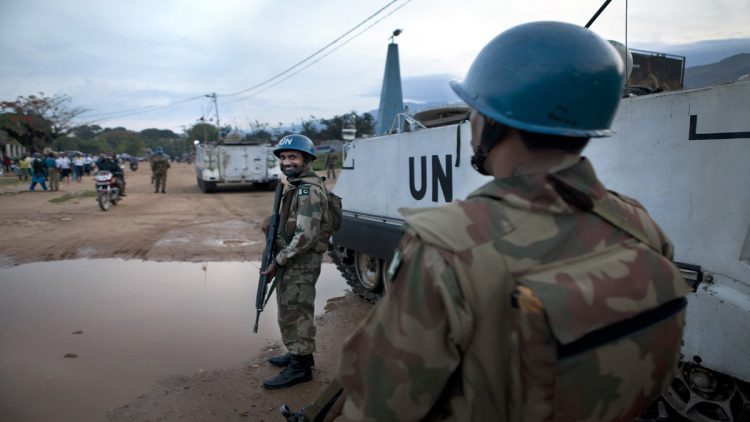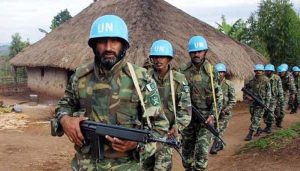 Conflict resolution, mediation and bilateral – multilateral negotiation is traditionally associated with the conventional and traditional diplomacy or public diplomacy. Modern evolution of international relations has not only perfected the art of diplomacy, but also cultivated crops of career diplomats, whose praxis of the subject matter makes them the flagbearers of national integrity and representatives of national interest. The consolidation of diplomacy amongst states, does not prevent varied level of inter-state and intra-state conflicts. In post-Cold War era, combined with violent extremism, intra-state conflicts have become the most troubling form of conflict, challenging the peace and sovereign integrity of many newly independent states of the global south. The intensity, rapidity and the attendant ramifications of such (intra-state) nature of conflict, prompted the United Nations Security Council (UNSC) to institute the UN Department of Peacekeeping Operations (UNDPKO) in 1948. Since then, military personnel have instrumentally contributed to the three level of peace construction – making, building, and keeping. A theoretical examination of the new responsibility, other than the traditional war enterprise, spurred the idea of military diplomacy. The idea was logically presented as a research article (UN Peacekeeping Operations and Successful Military Diplomacy: A Case Study of Pakistan) published by Dr. Najimdeen Bakare, in NUST Journal of International Peace & Stability III, no. 1 (2020):13-25. The publication attracted the attention of the Ministerie van Defensie – Dutch Ministry of Defence – The Netherland, and upon which Dr Najimdeen Bakare was invited as one of the international scholars – experts, to speak on Defence diplomacy and Military Diplomacy: Project group Military Diplomacy |September 2021. The trajectory of arguments within the research are as follows:
Conflict resolution, mediation and bilateral – multilateral negotiation is traditionally associated with the conventional and traditional diplomacy or public diplomacy. Modern evolution of international relations has not only perfected the art of diplomacy, but also cultivated crops of career diplomats, whose praxis of the subject matter makes them the flagbearers of national integrity and representatives of national interest. The consolidation of diplomacy amongst states, does not prevent varied level of inter-state and intra-state conflicts. In post-Cold War era, combined with violent extremism, intra-state conflicts have become the most troubling form of conflict, challenging the peace and sovereign integrity of many newly independent states of the global south. The intensity, rapidity and the attendant ramifications of such (intra-state) nature of conflict, prompted the United Nations Security Council (UNSC) to institute the UN Department of Peacekeeping Operations (UNDPKO) in 1948. Since then, military personnel have instrumentally contributed to the three level of peace construction – making, building, and keeping. A theoretical examination of the new responsibility, other than the traditional war enterprise, spurred the idea of military diplomacy. The idea was logically presented as a research article (UN Peacekeeping Operations and Successful Military Diplomacy: A Case Study of Pakistan) published by Dr. Najimdeen Bakare, in NUST Journal of International Peace & Stability III, no. 1 (2020):13-25. The publication attracted the attention of the Ministerie van Defensie – Dutch Ministry of Defence – The Netherland, and upon which Dr Najimdeen Bakare was invited as one of the international scholars – experts, to speak on Defence diplomacy and Military Diplomacy: Project group Military Diplomacy |September 2021. The trajectory of arguments within the research are as follows:
1. What is Military Diplomacy
The research theorises the concept of diplomacy and in that, produces the concept of military diplomacy,
 which remains an emerging concept. The research conceptually defines military diplomacy as a process of dialogue within a given system (UN – system) through which states (military actor – peacekeepers) pursue their purposes (national interest) by means other than armed conflict, through negotiation and/or mediation among the main protagonists in conflict.
which remains an emerging concept. The research conceptually defines military diplomacy as a process of dialogue within a given system (UN – system) through which states (military actor – peacekeepers) pursue their purposes (national interest) by means other than armed conflict, through negotiation and/or mediation among the main protagonists in conflict.
If traditional diplomacy involves convincing, persuading and coercing other states  to take particular actions, which they might necessarily be indisposed to doing. This is also technically and empirically true for military diplomacy as peacekeepers under the UN mandate, engage in convincing, persuading, coercing and dissuading warring parties from harm’s way.
to take particular actions, which they might necessarily be indisposed to doing. This is also technically and empirically true for military diplomacy as peacekeepers under the UN mandate, engage in convincing, persuading, coercing and dissuading warring parties from harm’s way.
2. Military Diplomacy, Peacekeeping and Peace
The research argues that peacekeeping missions over the years have acted with the intent of conducting diplomacy between warring parties. Hence, peacekeeping is a form of military diplomacy and like the traditional diplomacy, it is not confined to conflict containment, but also includes preventive analysis of insecurity, war limitation, constraining fighting geography, mitigation and eventual alleviation of conflict intensity and post-ceasefire peacekeeping. Based on preventive analysis of insecurity, under the banner of the UN, and in collaboration with local authority, military diplomacy should always be swiftly deploy to address looming conflictual issues, that could escalate into more troubling insecurity. Of course the issue of state sovereignty might be at risk, notwithstanding, it is incumbent on state actors, especially inter-governmental institutions to stimulate and facilitate the deployment of military diplomacy as counter and preventive measure. Hence, we can equally construe and locate military diplomacy as ‘preventive diplomacy,’ – a pre-emptive measure to mitigate against conflict escalation and a way of exercising good offices and mediation between two or more conflicting parties from resuming fighting and ensuring ceasefire agreement and more importantly, confidence and consensus-building process between the parties. As a ‘preventive diplomacy’ peacekeeping should be transformed from its current status – that is, ‘waiting for conflict to break out before sending peacekeepers’, Going by its import, military diplomacy through the effort of peacekeeper becomes a mitigation strategy against possible conflict escalation. Besides, such preventive measures open the doors for mediation, negotiation and third party role play that can re-channel conflict energy towards the direction of peace. Hence, military diplomacy contribute to reducing huge death tolls, battlefield fatalities, preventing conflict escalation, and the destruction of whatever development is achieved.
3. Comparison of Foot Soldiers and Diplomats
Other than acting on behalf of their respective states, diplomats have the proclivity of ‘overseeing  the implementation of agreements on the borders and assisting UN troops stationed in the region’, and subsequently reinforcing the liberal paradigmatic view by which ‘dialogue replaces confrontation’. Similarly, peacekeepers have equally demonstrated similar proclivity. And this is true for the Dayton agreement, Rwanda, Kosovo, Liberia, Sierra Leone and other UN peacekeeping mandates such as:
the implementation of agreements on the borders and assisting UN troops stationed in the region’, and subsequently reinforcing the liberal paradigmatic view by which ‘dialogue replaces confrontation’. Similarly, peacekeepers have equally demonstrated similar proclivity. And this is true for the Dayton agreement, Rwanda, Kosovo, Liberia, Sierra Leone and other UN peacekeeping mandates such as:
- UN Transitional Administration in East Timor (UNTAET) in October 1999 was a
 sign of new policy development; UN Transition Assistance Group for Namibia (UNTAG); UN Stabilization Mission in Haiti (MINUSTAH); UN Mission in Liberia (UNMIL); UN Transitional Authority in Cambodia (UNTAC); The UN Interim Administration Mission in Kosovo (UNMIK); in charge of the civilian sector; Kosovo Force (KFOR) in charge of the military sector was established based on the UN Security Council Resolution 1244, (Yugoslavia).
sign of new policy development; UN Transition Assistance Group for Namibia (UNTAG); UN Stabilization Mission in Haiti (MINUSTAH); UN Mission in Liberia (UNMIL); UN Transitional Authority in Cambodia (UNTAC); The UN Interim Administration Mission in Kosovo (UNMIK); in charge of the civilian sector; Kosovo Force (KFOR) in charge of the military sector was established based on the UN Security Council Resolution 1244, (Yugoslavia).
4. Difference between Military Diplomacy and Defense Diplomacy
While both forms of diplomacy may share some unique dissimilarities, yet, both are geared at the fulfilment of national interest, promotion of state’s interest, and constructing some degree of positive image before the other party. Regarding their unique dissimilarities, unlike military diplomacy (MD) that involves negotiation, convincing, persuading and coercing parties in conflict to follow a peaceful path, defence diplomacy (DD) is the promotion of a country’s image in terms of defence capability. As nations move towards boosting their defence industry, defence diplomacy contributes and enhances state’s economy. Similarly, defence diplomacy could be tailored towards the protection of state’s sovereignty and integrity from existential threat. On the other hand, military diplomacy is embarked upon to remove the existential threat confronting other state. While MD is outward, DD is inward looking. Yet one can surmise that both are tools of protecting the Westphalian state system and ensuring global order.
5. Pakistan’s Military Diplomacy Definition
Other than the generic and conventional reference to the declaration of the Quaid-e-Azam on June 3, 1947, as a major TCC, having a long history of undisputable contribution to global peacekeeping since 1960, Pakistan has not been able to develop its own definition of military diplomacy, like other countries, such as the Netherlands. Possessing a clear and straightforward definition will better position Pakistan amongst the comity of peacekeepers and will rationally and plausibly demonstrate both the soft and hard power of Pakistan. In addition to telling the world a different story about Pakistan’s foreign policy and relations, such a descriptive definition holds the benefit of showcasing Pakistan’s intuition towards foreign policy diversification.
- As part of defining Pakistan’s military diplomacy and redefining its foreign policy vis-à-vis military diplomacy, the research showcased Pakistan’s long tradition of peacekeeping. It believes Pakistan has come a long way in achieving appreciable milestones in its pursuit of military diplomacy. Since 1960, it has participated in 46 of 72 UN peacekeeping missions across the world, especially in Africa and up until now, it is still being instrumental in that cause. Peacekeeping as part of Pakistan’s foreign policy and military diplomacy is multifaceted. For instance, the Centre for International Peace and Stability (CIPS) is one, if not the major centre, where Pakistani potential peacekeepers (local and foreign – military and non-military persons) are sensitized and tutored in accordance with the different UN training modules. Such a centre should invariably be considered as part of its military diplomacy. And this should also be true for its aim to become a regional hub for military and non-military pedagogy.
- To internationalize its military diplomacy, Pakistan must open itself, more for international consultation – to the nations troubled by military insurgency. Deploying its experienced military officers to train others on how to confront the challenges of insurgency is an integral of military diplomacy. The relative success attained in erstwhile FATA should be propagated diplomatically. This engagement is a mechanism of foreign policy diversification through military diplomacy.
The author is an Assistant Professor at Department of Peace and Conflict Studies, Centre for International Peace and Stability (CIPS), National University of Sciences and Technology (NUST). He can be reached at drnajimdeen.pcs@nipcons.nust.edu.pk.
Author’s Research Profile: https://scholar.google.com.pk/citations?user=ToilCR4AAAAJ&hl=en






